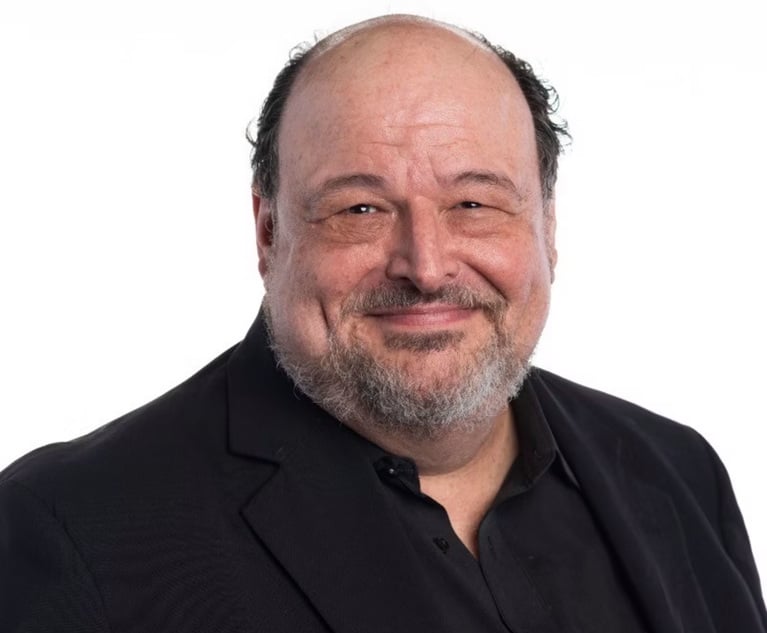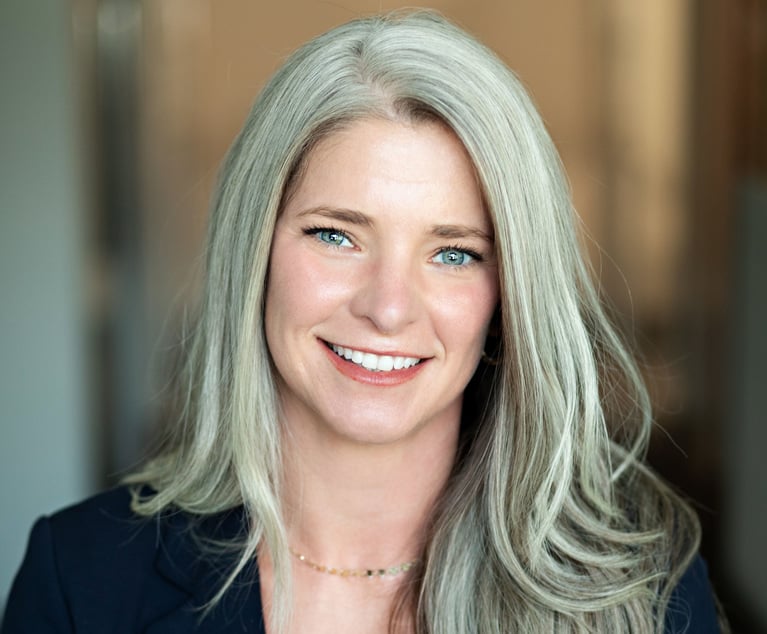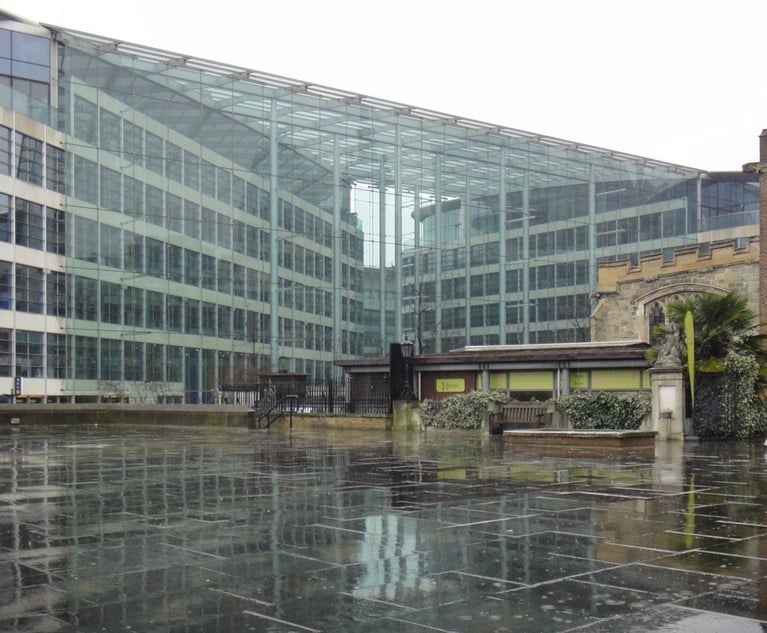Supreme Court issues first major patent decision of the term
Relatively hot on the heels of its 2010 ruling in Bilski v. Kappos that applied the machine-or-transformation test to business method patents before determining that such a test could create uncertainty regarding the patentability of things such as diagnostic medicine techniques, the Supreme Court tackled a similar issue earlier this...
March 23, 2012 at 07:52 AM
4 minute read
The original version of this story was published on Law.com
Relatively hot on the heels of its 2010 ruling in Bilski v. Kappos that applied the machine-or-transformation test to business method patents before determining that such a test could create uncertainty regarding the patentability of things such as diagnostic medicine techniques, the Supreme Court tackled a similar issue earlier this week.
In Mayo Collaborative Services v. Prometheus Laboratories, Inc., the high court explored the question of whether the correlation between blood test results and patient health is patentable. The plaintiffs argued that the patents in dispute are naturally occurring phenomena that should not qualify for patent protection. In a unanimous decision, the court agreed, ruling Tuesday that Prometheus cannot patent a medical test that relies on such correlations between drug dosages and treatment.
“For these reasons, we conclude that the patent claims at issue here effectively claim the underlying laws of nature themselves,” Justice Stephen Breyer wrote. “The claims are consequently invalid.”
The court said that similar to Albert Einstein not being able to patent E=mc2, or that Isaac Newton could not have claimed ownership of the law of gravity, Prometheus cannot patent a test kit that correlates a patient's blood chemistry with the best drug doses for treatment.
“Such discoveries are 'manifestations of . . . nature, free to all men and reserved exclusively to none,'” the opinion states.
The high court's decision overturns a Federal Circuit ruling that upheld Prometheus' patents.
Mayo v. Prometheus Labs may have a significant impact on future cases involving the patentability of human genes. According to Reuters, the American Civil Liberties Union (ACLU) believes this ruling is a good omen for its case against Myriad Genetics.
“We were really pleased with the Prometheus decision,” Sandra Park, an ACLU attorney representing researchers and breast cancer patients to invalidate Myriad Genetics' right to patent isolated breast cancer genes, said. “The decision bodes well for the ultimate outcome of the Myriad case.”
For more, read Reuters.
Relatively hot on the heels of its 2010 ruling in Bilski v. Kappos that applied the machine-or-transformation test to business method patents before determining that such a test could create uncertainty regarding the patentability of things such as diagnostic medicine techniques, the Supreme Court tackled a similar issue earlier this week.
In Mayo Collaborative Services v. Prometheus Laboratories, Inc., the high court explored the question of whether the correlation between blood test results and patient health is patentable. The plaintiffs argued that the patents in dispute are naturally occurring phenomena that should not qualify for patent protection. In a unanimous decision, the court agreed, ruling Tuesday that Prometheus cannot patent a medical test that relies on such correlations between drug dosages and treatment.
“For these reasons, we conclude that the patent claims at issue here effectively claim the underlying laws of nature themselves,” Justice Stephen Breyer wrote. “The claims are consequently invalid.”
The court said that similar to Albert Einstein not being able to patent E=mc2, or that Isaac Newton could not have claimed ownership of the law of gravity, Prometheus cannot patent a test kit that correlates a patient's blood chemistry with the best drug doses for treatment.
“Such discoveries are 'manifestations of . . . nature, free to all men and reserved exclusively to none,'” the opinion states.
The high court's decision overturns a Federal Circuit ruling that upheld Prometheus' patents.
Mayo v. Prometheus Labs may have a significant impact on future cases involving the patentability of human genes. According to Reuters, the American Civil Liberties Union (ACLU) believes this ruling is a good omen for its case against Myriad Genetics.
“We were really pleased with the Prometheus decision,” Sandra Park, an ACLU attorney representing researchers and breast cancer patients to invalidate Myriad Genetics' right to patent isolated breast cancer genes, said. “The decision bodes well for the ultimate outcome of the Myriad case.”
For more, read Reuters.
This content has been archived. It is available through our partners, LexisNexis® and Bloomberg Law.
To view this content, please continue to their sites.
Not a Lexis Subscriber?
Subscribe Now
Not a Bloomberg Law Subscriber?
Subscribe Now
NOT FOR REPRINT
© 2024 ALM Global, LLC, All Rights Reserved. Request academic re-use from www.copyright.com. All other uses, submit a request to [email protected]. For more information visit Asset & Logo Licensing.
You Might Like
View All
'The Show Must Go On': Solo-GC-of-Year Kevin Colby Pulls Off Perpetual Juggling Act

How Amy Harris Leverages Diversity to Give UMB Financial a Competitive Edge
5 minute read
How Marsh McLennan's Small But Mighty Legal Innovation Team Builds Solutions That Bring Joy

Immigration Under the Trump Administration: Five Things to Expect in the First 90 Days
8 minute readTrending Stories
- 1Gibson Dunn Sued By Crypto Client After Lateral Hire Causes Conflict of Interest
- 2Trump's Solicitor General Expected to 'Flip' Prelogar's Positions at Supreme Court
- 3Pharmacy Lawyers See Promise in NY Regulator's Curbs on PBM Industry
- 4Outgoing USPTO Director Kathi Vidal: ‘We All Want the Country to Be in a Better Place’
- 5Supreme Court Will Review Constitutionality Of FCC's Universal Service Fund
Who Got The Work
Michael G. Bongiorno, Andrew Scott Dulberg and Elizabeth E. Driscoll from Wilmer Cutler Pickering Hale and Dorr have stepped in to represent Symbotic Inc., an A.I.-enabled technology platform that focuses on increasing supply chain efficiency, and other defendants in a pending shareholder derivative lawsuit. The case, filed Oct. 2 in Massachusetts District Court by the Brown Law Firm on behalf of Stephen Austen, accuses certain officers and directors of misleading investors in regard to Symbotic's potential for margin growth by failing to disclose that the company was not equipped to timely deploy its systems or manage expenses through project delays. The case, assigned to U.S. District Judge Nathaniel M. Gorton, is 1:24-cv-12522, Austen v. Cohen et al.
Who Got The Work
Edmund Polubinski and Marie Killmond of Davis Polk & Wardwell have entered appearances for data platform software development company MongoDB and other defendants in a pending shareholder derivative lawsuit. The action, filed Oct. 7 in New York Southern District Court by the Brown Law Firm, accuses the company's directors and/or officers of falsely expressing confidence in the company’s restructuring of its sales incentive plan and downplaying the severity of decreases in its upfront commitments. The case is 1:24-cv-07594, Roy v. Ittycheria et al.
Who Got The Work
Amy O. Bruchs and Kurt F. Ellison of Michael Best & Friedrich have entered appearances for Epic Systems Corp. in a pending employment discrimination lawsuit. The suit was filed Sept. 7 in Wisconsin Western District Court by Levine Eisberner LLC and Siri & Glimstad on behalf of a project manager who claims that he was wrongfully terminated after applying for a religious exemption to the defendant's COVID-19 vaccine mandate. The case, assigned to U.S. Magistrate Judge Anita Marie Boor, is 3:24-cv-00630, Secker, Nathan v. Epic Systems Corporation.
Who Got The Work
David X. Sullivan, Thomas J. Finn and Gregory A. Hall from McCarter & English have entered appearances for Sunrun Installation Services in a pending civil rights lawsuit. The complaint was filed Sept. 4 in Connecticut District Court by attorney Robert M. Berke on behalf of former employee George Edward Steins, who was arrested and charged with employing an unregistered home improvement salesperson. The complaint alleges that had Sunrun informed the Connecticut Department of Consumer Protection that the plaintiff's employment had ended in 2017 and that he no longer held Sunrun's home improvement contractor license, he would not have been hit with charges, which were dismissed in May 2024. The case, assigned to U.S. District Judge Jeffrey A. Meyer, is 3:24-cv-01423, Steins v. Sunrun, Inc. et al.
Who Got The Work
Greenberg Traurig shareholder Joshua L. Raskin has entered an appearance for boohoo.com UK Ltd. in a pending patent infringement lawsuit. The suit, filed Sept. 3 in Texas Eastern District Court by Rozier Hardt McDonough on behalf of Alto Dynamics, asserts five patents related to an online shopping platform. The case, assigned to U.S. District Judge Rodney Gilstrap, is 2:24-cv-00719, Alto Dynamics, LLC v. boohoo.com UK Limited.
Featured Firms
Law Offices of Gary Martin Hays & Associates, P.C.
(470) 294-1674
Law Offices of Mark E. Salomone
(857) 444-6468
Smith & Hassler
(713) 739-1250






